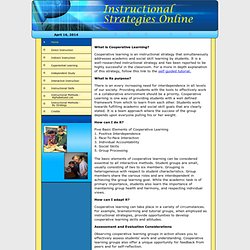

The Best Sites For Cooperative Learning Ideas. NOTE: You might also be interested in My Best Posts On The Basics Of Small Groups In The Classroom You might also find my Education Week Teacher post, Response: Do’s and Don’ts for Better Project-Based Learning, useful.

Also: Different Ways Of ‘Learning By Doing’ Q & A Collections: Project-Based Learning is the headline of one of my Education Week Teacher columns. It contains links to all my posts on Project-Based Learning from the past five years – in one place! I’m now working on my third book, which is focused on instructional and classroom management strategies geared towards developing student autonomy and personal responsibility (as opposed to student obedience or student rebellion). I’ll be writing a post soon inviting reader contributions to the book, too. One of the strategies I’ll be writing about is cooperative learning.
Here are my choices for The Best Sites For Cooperative Learning Ideas: SWIFT Center Research to Practice Brief: Collaborative Learning Surprise, Surprise! Not bad… Articles by Dr. Spencer Kagan - Kagan Coaching™ Dr.

Spencer Kagan The research is clear: Student achievement depends, to a large extent, on teacher skills. It is the skills of the teacher that determine success or failure for many students. Some teachers consistently obtain high levels of student achievement while other teachers’ students regularly fail to meet basic standards. Kagan Coaching™ is proving to be one of the most powerful tools available for enhancing teacher skills. In 1999 as part of her efforts to get Kagan model schools “as good as they can be,” Laurie Kagan developed Kagan Coaching™. The essence of Kagan Coaching™ is coaching teachers in real time.
There are many coaching models, each differing from the others in a number of ways. As seen at a glance in the table, Kagan Coaching™ is radically different from traditional approaches to coaching along a number of dimensions. Unit of Observation In traditional coaching the lesson is the unit of observation. The time-frame for Kagan Coaching™ is radically different. Energizing Brain Breaks. Cooperative Learning. Definition Cooperative learning consists of instructional techniques that require positive interdependence between learners in order for learning to occur.

Basic Elements Research shows that both competitive and cooperative interaction are a healthy part of a child’s repertoire of behavior. By second grade, however, urban children have effectively extinguished their cooperative behavior and persist in competition, even when it’s counterproductive. By developing deliberately cooperative techniques, educators aim to correct the unconscious societal and educational bias that favors competition.
Research has also found an interesting racial implication in cooperative learning: Minority children are more likely to retain these cooperative strategies. Patterns for student interaction are called structures. It is up to the instructor to integrate the interactive exercises with the specific lesson content. Reading Spencer Kagan, Cooperative Learning, Resources for Teachers, 1992. Cooperative Learning Techniques. Latest News on Collaborative Learning Kagan - Mitra Education. Cooperative Learning and Geometry: High School Activities - Product Details @ Learning Network NZ. Effective Geometry Lessons: Cooperative Learning by Ashley Walther on Prezi. Cooperative Learning. What is Cooperative Learning?

Cooperative learning is an instructional strategy that simultaneously addresses academic and social skill learning by students. It is a well-researched instructional strategy and has been reported to be highly successful in the classroom. For a more in depth explanation of this strategy, follow this link to the self-guided tutorial. What is its purpose? There is an every increasing need for interdependence in all levels of our society. How can I do it? Five Basic Elements of Cooperative Learning 1. The basic elements of cooperative learning can be considered essential to all interactive methods. How can I adapt it? Cooperative learning can take place in a variety of circumstances.
Assessment and Evaluation Considerations Observing cooperative learning groups in action allows you to effectively assess students' work and understanding. Teacher Resources.